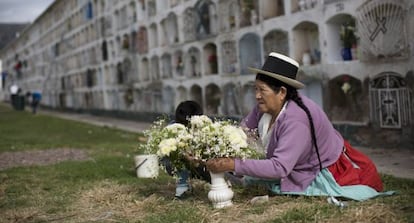Calls for Peru to abandon regional rights court grow louder
Costa Rica-based IACHR awards ex-terrorist and her family $105,000 in compensation

Every time the Inter-American Court for Human Rights (IACHR) orders Peru to pay compensation to members of past terrorist groups or their family members, the calls from Peruvian officials to withdraw its membership from the tribunal’s jurisdiction grow louder.
Now the cries have returned again after the IACHR ruled in favor of Gladys Espinoza Gonzáles, a former member of the Túpac Amaru (MRTA) guerrilla movement who was tortured and raped by police in 1993 following her capture.
In November, the Costa Rican-based court ordered the Peruvian government to pay her $60,000, plus $40,000 to her mother and $5,000 to her brother. Because the mother has since died, her portion will be shared by the family.
But Peru said Espinoza owes the state $11,200 for the damages she helped cause as a MRTA member.
Espinoza Gonzáles, a former Tupac Amaru guerrilla, was tortured and raped by police in 1993
Justice Minister Fredy Otárola said the amount needed to be adjusted to add on interest that had accumulated since her conviction in 2004, when she was sentenced to 25 years in prison.
The MRTA, along with the Shining Path, terrorized the nation from 1980 to 2000. Although the Túpac guerrilla movement – founded in 1982 by Víctor Polay Campos – extended its activities from Lima to the jungle, its demise came following the daring kidnapping of the Japanese ambassador to Peru and others at the embassy in 1996.
Espinoza and her then-partner, who was also a MRTA member, were arrested in 1993 during the government of president Alberto Fujimori in connection with the kidnapping of businessman Antonio Furukawa. She was taken to the police’s kidnapping investigations division where she was beaten and raped.
Her lawyer, Gloria Cano, told EL PAÍS that her client agreed that the $11,200 she owes the Peruvian government should be subtracted for the compensation awarded by the IACHR, but that no interest should be applied.
Cano said she was ready to file an appeal to demonstrate that she had been prohibited from working since her arrest after she was considered a high-security risk.
“Since 1995, there have been 30 sentences handed down against the Peruvian government by the Inter-American Court, and the compensation has reached $18 million,” said Carlos Rivera, a law professor specializing in human rights cases. “We have to ask ourselves: why did we lose all the time?
“Peru always met its compensation obligations ordered by the Court until the government of Alejandro Toledo (2001-2006),” he explained. “But after the Castro Castro sentence, there was a break and it’s difficult to determine in which cases Peru has met its obligations.”
Under the Castro Castro ruling, the court ordered the Peruvian government to pay $50,000 each to the descendants of 41 Shining Path members who were murdered in prison during massacres that took place between May 6 and 9, 1992. The court set additional amounts for the victims’ families and other inmates who were tortured during the incidents.
The previous government of President Alan García said it would no longer pay compensation in terrorism cases
During the previous government of President Alan García, the Justice Ministry announced in 2010 that it would no longer pay compensation in “any case involving terrorism.”
“As ministerial policy, we must point out that this is the last in the list of our priorities,” the justice minister said.
Last week, Mauricio Mulder, a congressional spokesman for the opposition American Revolutionary Popular Party (APRA), criticized the court’s ruling in the Espinoza case.
“I think the Peruvian government should lodge a protest,” Mulder said. “There should also be a process where these types of sentences can be reviewed by the same court.”
Along similar lines, Supreme Court Chief Justice Javier Villa Stein, who called the ruling unacceptable, suggested a referendum to determine whether Peru should abandon the court’s jurisdiction as Venezuela did in protest in 2013.
Tu suscripción se está usando en otro dispositivo
¿Quieres añadir otro usuario a tu suscripción?
Si continúas leyendo en este dispositivo, no se podrá leer en el otro.
FlechaTu suscripción se está usando en otro dispositivo y solo puedes acceder a EL PAÍS desde un dispositivo a la vez.
Si quieres compartir tu cuenta, cambia tu suscripción a la modalidad Premium, así podrás añadir otro usuario. Cada uno accederá con su propia cuenta de email, lo que os permitirá personalizar vuestra experiencia en EL PAÍS.
¿Tienes una suscripción de empresa? Accede aquí para contratar más cuentas.
En el caso de no saber quién está usando tu cuenta, te recomendamos cambiar tu contraseña aquí.
Si decides continuar compartiendo tu cuenta, este mensaje se mostrará en tu dispositivo y en el de la otra persona que está usando tu cuenta de forma indefinida, afectando a tu experiencia de lectura. Puedes consultar aquí los términos y condiciones de la suscripción digital.








































